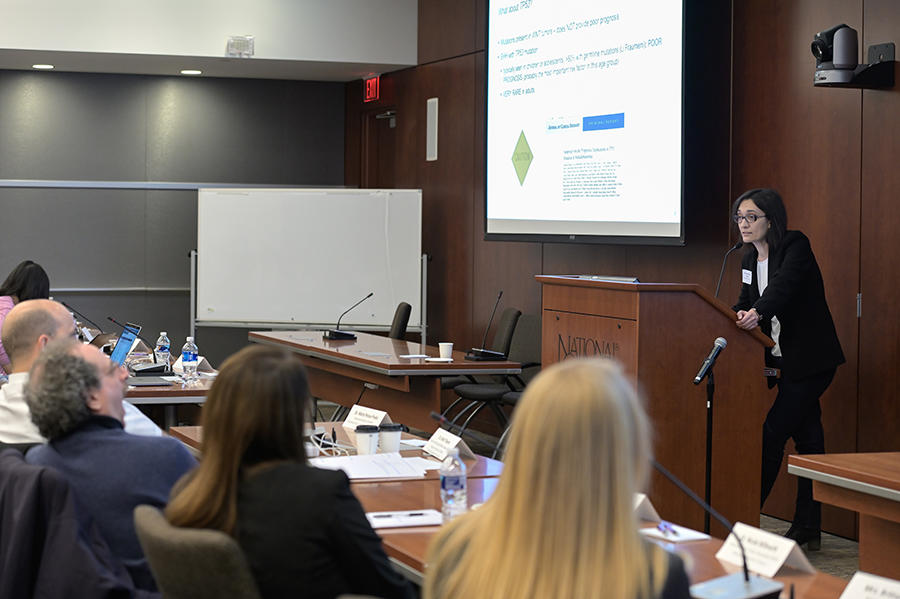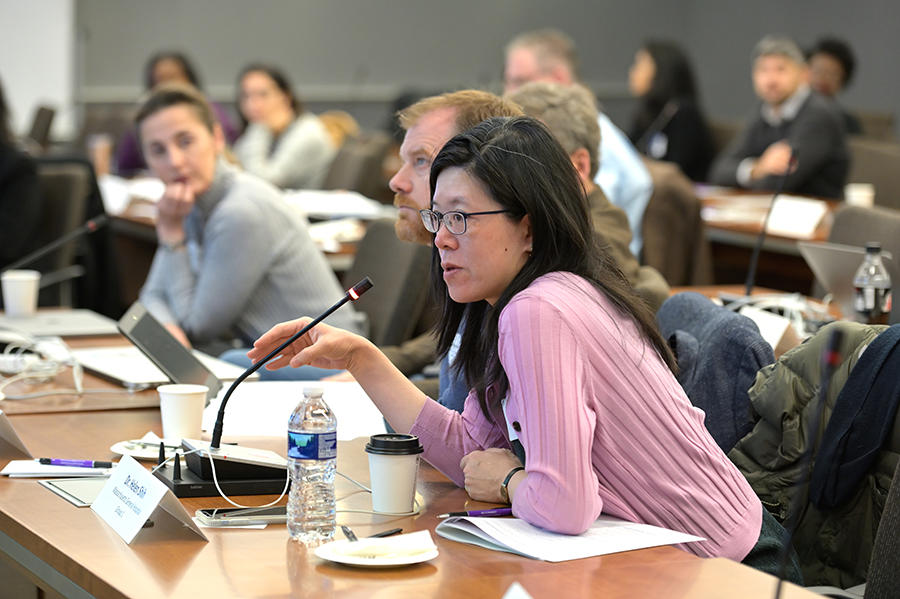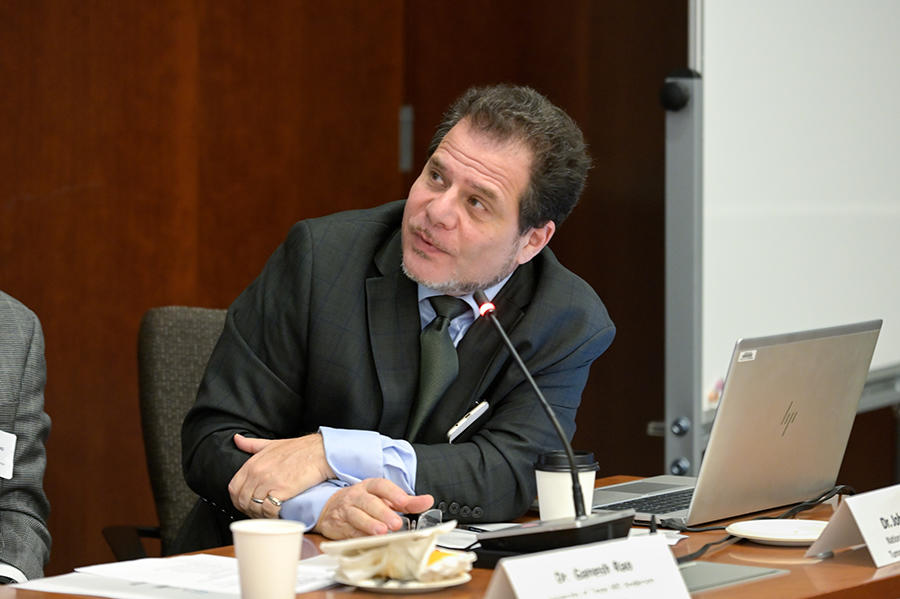2019 Adult Medulloblastoma Workshop
, by Kristin Odom, NCI-CONNECT Communications Editor
The NCI-CONNECT Adult Medulloblastoma Workshop was held at NIH on November 25, 2019. Neuro-oncology experts from multiple disciplines met to discuss the scientific progress and challenges of treating medulloblastoma in adults and to find ways to collaborate to advance research and treatments. The workshop concluded with recommendations and an action plan published in a proceedings paper in Neuro-Oncology Advances.
The workshop was led by Marta Penas-Prado, M.D., of the NCI Center for Cancer Research's Neuro-Oncology Branch.
Medulloblastomas are all classified as grade 4 tumors. These rare brain and spine tumors are fast-growing and about 30 percent return after therapy. Medulloblastomas can occur in both children and adults but are more common in children. It is estimated that less than 150 adults are diagnosed each year in the United States.
“Medulloblastoma is rare in adults, making research difficult and leaving unanswered questions. Coordinating the efforts of clinicians, researchers, and patient advocacy organizations is necessary to speed up progress,” says Dr. Penas-Prado.
Despite advances in molecular classification, there has been little change in treatment and no significant improvement in survival for adults with medulloblastoma over the last two decades. Understanding molecular markers that determine the course of the disease has advanced considerably in pediatric medulloblastoma, but the association of these markers with specific molecular subgroups and outcome is less clear in adults. Furthermore, the molecular markers differ between adults and children.
Treatment typically includes surgery first to remove as much of the tumor as possible and to obtain tissue to determine the tumor type and molecular subgroup, followed by radiation to the entire brain and spinal cord (called craniospinal radiation). While data in children support the use of chemotherapy after radiation, the benefit of chemotherapy has not been tested in randomized trials in adults. However, cumulative evidence from single arm, observational, and retrospective studies indicate the benefit of adjuvant chemotherapy, but with associated toxicity. Because of the lack of adequate clinical trial data, treatment of adults remains highly variable.
A major challenge to improving treatment and outcomes for adult patients with medulloblastoma is the lack of universal testing to assign a tumor subgroup. The challenge remains because the methodology to determine subgroups is not standardized and/or available across all institutions. While the 2016 World Health Organization says medulloblastomas can be defined histologically or genetically, it does not include biomarkers to determine prognosis beyond a very rare mutation in adults (p53).
Another challenge is that adults can have tumor recurrence many years after the initial diagnosis. Current clinical risk stratification tools and molecular subgrouping are insufficient to predict this outcome. Development of risk-adjusted upfront treatment based on molecular risk factors, long-term follow-up, and better rescue treatments are all critical needs for optimal care.
NCI-CONNECT is working in partnership with the neuro-oncology community to overcome the challenges of a rare brain or spine cancer diagnosis. Adult patients with medulloblastoma in an online support community expressed a desire for more guidance on treatment decisions (e.g., whether to receive chemotherapy at diagnosis), and reported feeling lonely and uncertain about the future. They posted it was upsetting learning their oncologist had never seen an adult with medulloblastoma. The Adult Medulloblastoma Workshop is the first step to creating a collaborative network to study medulloblastoma in adults, develop clinical trials to improve treatments and patient outcomes, and ensure each patient is well educated about their disease and well informed about their treatment options.
During the workshop, leaders in the field provided an overview of advances in adult medulloblastoma research and upcoming and ongoing clinical trials. Most trials that produced modest patient responses focused on the use of smoothened (SMO) inhibitors for patients with recurrent medulloblastoma who have the Sonic Hedgehog (SHH) subtype, which is most common in late adolescents and adults. While SMO as a single agent has failed to improve survival in recurrent tumors, preclinical and clinical data support testing SMO inhibitors in the upfront setting to reduce relapse—and also in recurrent disease as combination therapy.
Four smaller working groups discussed clinical trials, tissue acquisition and testing, tumor modeling, and measurement of clinical outcomes.
- The Clinical Trials Working Group discussed selecting inclusion and exclusion criteria in upcoming trials for newly diagnosed adults to allow for comparable populations between studies. They also discussed collaborating to share data worldwide and design optimal trials for recurrent medulloblastoma of all subgroups; combining efforts in the pediatric and adult communities; and collecting data from patients unable to participate in clinical trials.
- The Tissue Acquisition and Testing Working Group addressed the types of samples to obtain in routine practice, clinical trials, and registries; optimal methods for subgrouping and risk stratification with genome-wide DNA methylation as the preferred method to confirm diagnosis and determine the subgroup; and collaboration on repositories and registries to share data.
- The Tumor Modeling Working Group focused on collaborations to create animal, patient-derived xenograft, or bioinformatic models that recapitulate adult medulloblastoma.
- The Measurement of Clinical Outcomes Working Group discussed which data and instruments should be used to collect outcomes data and how to include such evaluations in upcoming clinical trials and practice.
“Importantly, the discussions helped identify action items and opportunities for collaboration to expedite progress and advance research and care for adults with medulloblastoma,” says Dr. Penas-Prado.
The Neuro-Oncology Advances proceedings paper details the Adult Medulloblastoma Workshop and shares its important recommendations and action items.


